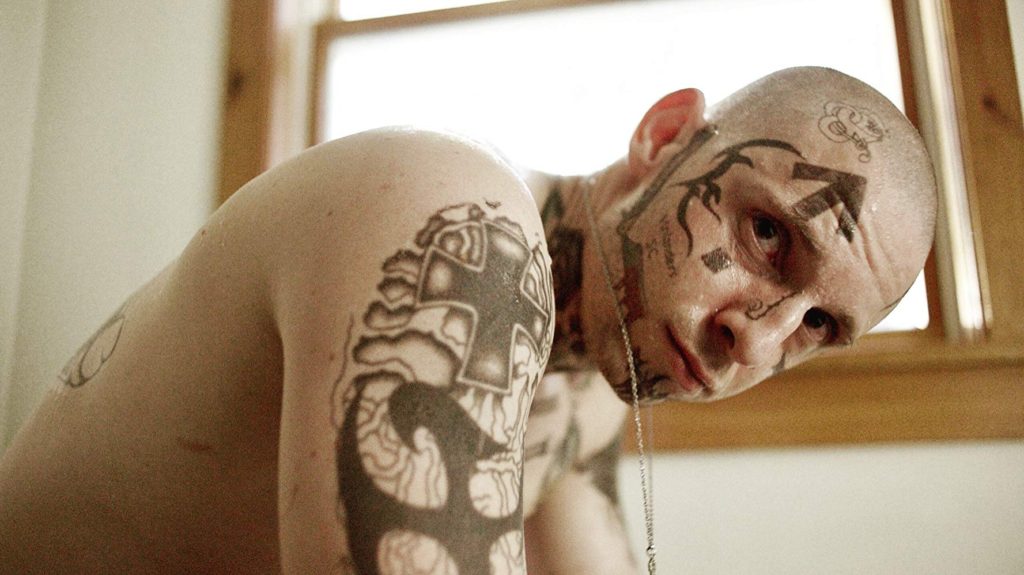Guy Nattiv was a filmmaker preparing to move from Tel Aviv to the United States, and looking for the right idea to turn into a feature-length movie, when he came across a stunning photo essay in the Israeli newspaper Haaretz about a former American neo-Nazi named Bryon Widner.
Through a series of dramatic photos, the article revealed Widner’s incredible transformation — he subjected himself to nearly two years of laser-based tattoo removals to get rid of the white supremacist designs that had covered his head and body for years. Fascinated by the story, Nattiv tracked Widner down via his Facebook account and asked if he could meet him and discuss making a movie about his journey.
Their eventual collaboration led to an Oscar-winning live-action short film called “Skin,” as well as a new feature film of the same name that will be released July 26 by the hottest indie distributor in the business right now, A24. As they await its opening night, Widner and Daryle Jenkins — the African American anti-fascist activist who helped Widner escape his neo-Nazi ties and change his life — discussed their friendship, Widner’s adoption of Christianity, and the vital mission of combating racial hatred in America.
“I was at a punk show and ran into skinheads when I was 14,” said Widner. “I could have wound up falling in with anyone, but they were there. They gave me things I needed and I was made to feel I owed them everything.”
After an extremely rough childhood, Widner ran away from home in junior high school. At first, he felt like the group of skinheads he befriended and the adult couple who controlled their lives had become a de facto family for him — an emotional manipulation depicted in the feature version of “Skin” through the character of another boy, Gavin.
In the movie, the skinheads are overseen by a couple named Fred “Hammer” Krager (Bill Camp) and Shareen (Vera Farmiga). Fred intimidates his young charges with an iron fist, while Shareen is almost more insidious, offering home-cooked meals and motherly affection to the young men and women who fall under her sway.
As the movie opens, Bryon (Jamie Bell) has been under their thumb for years and is hopelessly covered in white-supremacist symbols that seem to ensure he’ll never have a normal job. As his band of skinheads faces off in a violent confrontation with a group of black counter-demonstrators at a white supremacy march, Bryon winds up kicking and beating a teenage boy into needing a lengthy hospital stay.
But despite his ugly macho bravado, it’s clear that Bryon is starting to hate what he’s become. When the police capture him in a raid and try to make him talk, he starts to see that becoming an informant is the only way out. Meanwhile, he meets a sweet but dangerously naive single mother named Julie (Danielle Macdonald), who shows him that love can be found beyond the distorted environment he is trapped inside. He also warily befriends the local black activist Daryle (Mike Cotter), taking the final steps to his life-or-death decision to change his ways.
“Skin” is often difficult to watch. It has unexpected, sudden bursts of extreme violence and a near-constant flow of profanity and racial epithets — yet as Bryon risks everything to transform his heart and his life, it’s also undeniably moving and uplifting by the end. For those who can brave the harsher aspects and become immersed in the heartfelt story beneath the ugliness, it is a movie that is likely not to be forgotten.
“My faith came about after getting out of the movement,” explained Widner. “I don’t think it impacted the decision. I just let go of the wheel and let God take over, which is a very difficult thing to do. I read a Catholic German old Bible my ex-wife Julie had. Certain things made more sense to me then, than had previously in my life. My relationship with God came pretty quickly.”
For his part, Daryle found that seeing the feature-length version of the film exposed him to aspects of Bryon’s traumatic experiences he didn’t know about before. He felt that the movie “depicted me spot on,” and he too ultimately saw it as a story of transformation through faith.
“Faith can be important, and faith-based people should realize there’s a lot of lost souls out there, and help them find direction,” he said. “I grew up in faith, and both my parents were beholden for the direction I went in. I remain beholden to their spiritual direction.To everyone who watches this movie, there’s a role to play. Hopefully this movie will inspire them to play that role.”
Start your day with Always Forward, our award-winning e-newsletter. Get this smart, handpicked selection of the day’s top news, analysis, and opinion, delivered to your inbox. Sign up absolutely free today!

